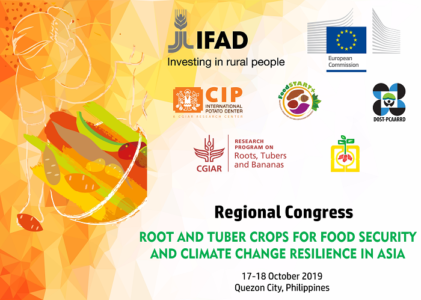- Root and tuber crops (RTCs) are versatile and vital for food security and climate change resilience. An example of this in the Philippines followed the destruction of Typhoon Haiyan, when the distribution of planting materials for sweetpotato and cassava on the islands of Leyte and Samar boosted the recovery efforts.
 However, despite their potential to address agricultural, environmental, and nutritional concerns, RTCs are often overlooked and undervalued. There are untapped opportunities for increasing their utilization and consumption, and the productivity of smallholder farms, yet efforts and policies to improve the industry, investment in R&D and dissemination of technologies are limited.
However, despite their potential to address agricultural, environmental, and nutritional concerns, RTCs are often overlooked and undervalued. There are untapped opportunities for increasing their utilization and consumption, and the productivity of smallholder farms, yet efforts and policies to improve the industry, investment in R&D and dissemination of technologies are limited.
The good news is that efforts to improve this situation have emerged through financial support from the government, international organizations and donors. An example is the regional congress, “Root and Tuber Crops for Food Security and Climate Change Resilience in Asia,” to be held October 17—18, 2019 at the Luxent Hotel, in Quezon City. The congress will be a venue for discussing and promoting cross learning in RTC science and technology, policy measures, and pragmatic approaches for exploiting opportunities to address the challenges of climate change.
The event is organized by the International Potato Center (CIP) and Philippine Council for Agriculture, Aquatic and Natural Resources Research and Development of the Department of Science and Technology (DOST-PCAARRD) in collaboration with the Philippine Root Crop Research and Training Center (PhilRootcrops) of Visayas State University (VSU) and with financial support from the International Fund for Agricultural Development (IFAD) and the European Union (EU). It aims to share the key findings, knowledge products and recommendations for scaling up innovations introduced by FoodSTART+, a research initiative funded by the EU and IFAD that worked with five large scale IFAD investments in the Philippines, India, Indonesia and Vietnam to enhance food resilience in upland and coastal communities vulnerable to climate change through RTC innovations.
Over 100 participants have registered for the congress. Besides a large representation from the Philippines, participants from India, Myanmar, Vietnam, Lao PDR, Indonesia, and Pacific islands are expected to attend. The congress has four parts: Plenary Sessions on breeding, agronomy, pest and disease management, and root and tuber contributions to the resilience of agri-food systems; a Knowledge Learning Fair (KLF) showcasing innovations in seed systems, postharvest practices and product development from selected organizations; Roundtable discussions; and Field Visits in Pampanga to present successful experiences in cultivation, processing and contractual arrangements for sweetpotato and cassava.
The goal of this event is to raise awareness, understanding, and appreciation among researchers, extension workers, policy makers, private sector, development practitioners, farmers’ organizations, donors, media and the general public of RTCs’ role food security and climate change resilience.
